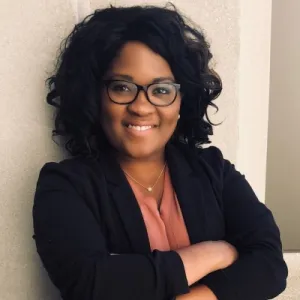February 16, 2023
A community’s food retail environment can have a powerful impact on the health of its residents. An individual’s proximity to stores, restaurants, and vendors, and the specific food item that are available and affordable at those locations influence what people decide to purchase and consume. If the food environment is unhealthy and other barriers exist, such as racial, socioeconomic, and geographic disadvantages, it can produce diets that lead to health inequities for a community.
The research of Kristen Cooksey Stowers from the College of Agriculture, Health and Natural Resources (CAHNR) aims to expose these structural challenges and point towards opportunities and resources to help communities make changes to their food systems. She accomplishes this by leveraging Community-Based Participatory Research (CBPR) methods to examine the influence of public policy on health outcomes to make food environments more equitable for marginalized populations.
“I spend time talking to partners to determine which tools we can use to study and validate their needs, working in partnership with the community,” says Cooksey Stowers, an assistant professor in the Department of Allied Health Sciences. “We collect data and interpret it alongside community partners and residents and then make decisions about how to disseminate our findings.”
Cooksey Stowers employs CBPR to study the root causes of health inequities. The CBPR methodology ensures community stakeholders are equal partners with researchers. From grantwriting, research design and implementation to evaluation and dissemination, everyone works together each step of the way.
CBPR emphasizes building relationships between academic, medical, and community partners, ensuring a “two-way street” to establish trust and a commitment to achieving long-term health goals for a community.
“The Gallery Walk for the Invest Health Hartford Team is a great example of what makes the CBPR approach unique, creating a visual story with community partners to talk about the research rather than only publishing a paper in a journal read by academics. A part of this research is being a bridge and translator in the community.”
Led by the United Way, the Invest Health (IH) Hartford Team works to examine, assess, and improve the neighborhood food environment in North Hartford. As the evaluator on the IH Hartford team, Cooksey Stowers led a comprehensive food store audit to assess food swamp exposure in 2020. The audit included a resident survey to examine perceived food access, shopping habits, and food insecurity amid the Covid-19 pandemic, and a photovoice project where residents took pictures of their food shopping experiences for three days with commentary on their vision for solving the inequities.
The research has been instrumental for the Healthy Hartford Hub and the resident-led Community Action Task force of the Invest Health initiative, that is focused on bringing a full-service grocery store to North Hartford.
The results of the food store audit, resident survey, and photovoice project were put on display as a Gallery Walk in the Hartford City Hall Atrium for Thriving Together: Community and Economic Development for Health and Equity, an event and working sessions held in the city in September. Hartford residents, municipal leaders, and other supporters invited community organizers from Roseville, Calif. and Spartanburg, SC, two cities also supported by the Invest Health initiative, to share and collaborate on their plans for improving residents’ health and advancing economic development to create more equitable communities.
“My community partners wanted to lead with the vision and tell a story that shows value and strength, taking an assets-based approach and displays resilience. It gives credit to historically marginalized populations and community in showing strength to overcome structural racism, while not watering down the fact that there are social injustices and health inequities,” says Cooksey Stowers.

